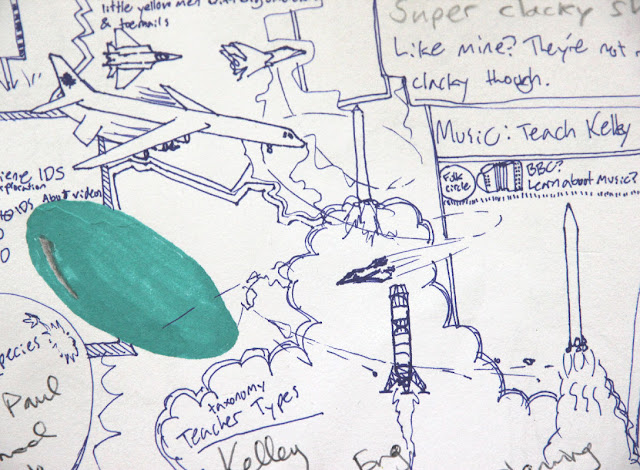My teens are now participating in an intentionally democratic group educational experience. That sounds rather vague, but the vaguery comes more out of the complexity and open-endedness of the arrangements than from lack of determination. Let me try to explain!
The other day I arrived early to pick up my kids, and ended up sitting in on the sidelines of their meeting. They would have preferred I wasn't there, but I was glad to have witnessed part of this special event. About thirty teens shared their plans and dreams for the coming year, and attempted to create a schedule of activities. It's a deeply complex process, as each participant has different long-term goals, and somehow they have to design their schedule, meeting spaces, social groups and activities in a way that works for everyone. The most inspiring part of all of this was to see the teens take over the process. There were a handful of adults helping, but their openness to guidance from the teens meant that the teens truly did control the process, and came out of the whole thing not just feeling empowered, but legitimately in power of their education.
 |
| notes from the teen meeting |
- photography class
- food safe class
- beekeeping workshop at a farm
- general adulting class
- rock climbing
- first aid certification
- biology 11 class
- attending university lectures
- building movie props
- creative writing feedback group
- heckling bad movies
Teens need to take control of their own lives for a number of reasons. Biologically, that is what they are naturally doing: moving on to a life independent of their parents, and participating in all the activities that adults do. It might take them a while to get the hang of it all (hence, I suppose, their desire for a general adulting class!), but that's just another reason for them to get on with it and take their independence - by force, if necessary. Most of our teens' souls are crying out "let me go! I don't need you! Let me do it myself or die trying!", while a deep ache in their hearts cries "Wrap me up and rock me to sleep, Mummy!" or "Look after me!" or "Look at me!!!" And the drama caused by this tension is part of it all. Some teens embrace this drama; some don't, but it's going to happen, regardless. The drama helps them gain the independence they need. Our teens need our praise and support and advice and they need us to help them pick up the pieces when things fall apart. But they also need to feel like they're capable of doing it, themselves, and they can only become capable by trying.
Back to the pink ribbon I now have tied around my wrist. I've been fighting a lot with my kids, recently, about the messes left behind, and their often-dramatic way of refusing to clean up. With pop music and/or accordion-playing filling my ears, with the flow of friends and food-messes and project refuse all over the place, I often feel besieged in my own home, and I have not been the serene and accepting parent I wish I was. Still, I want them to do these things! I want their lives to be rich and loud and boisterously busy and inspired, and that's exactly what they're doing! But four people with different needs under one smallish roof is always a challenge. Because I'm their parent, I've been trying to corral them, and I've been unschooling now long enough to know that's counter-productive. Watching my kids gamely manage their own education and social lives has reminded me that not only are they successfully doing everything I hoped they would, but I can't force them to clean up. They'll have to get there on their own. It's what I wanted, but it's hard to let go. Parenting is humbling.
The pink ribbon is to remind me that peace is more important than a clean home, or than keeping control. I look at it and remember when they were infants and I hoped with all my heart they'd be who they are today. In this mess, we are arriving at our destiny. I can only hold on for the ride, hold on to my heart, and hold on to my babies when, inevitably, they drape their giant bodies over me for comfort.
And sometimes when I need a break I bring a cup of tea over to my parents' house and chat with my mother. Her house is much quieter than ours, and her temper rather less volatile. But it wasn't always this way. Once she parented teens, too. And we all survived.











